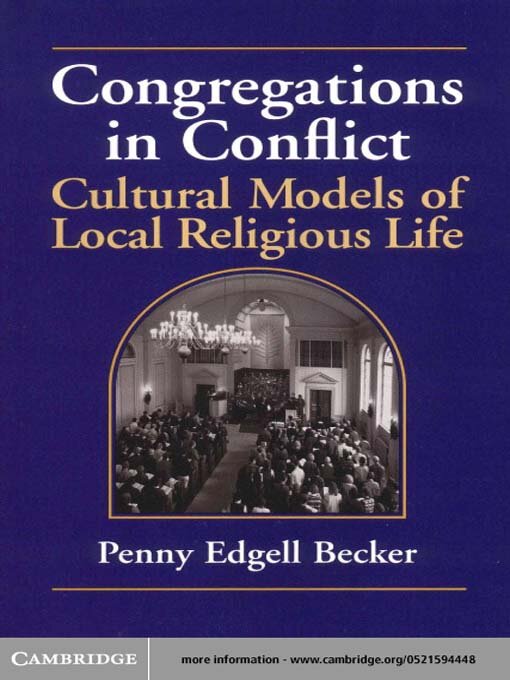Penny Edgell Becker, Congregations in Conflict: Cultural Models of Local Religious Life. Cambridge, 1999.
Referenced in: Conflict Educaiton – Case Studies
LifeandLeadership.com Summary
This is not a book on conflict skills or intervention strategies. Its main contribution is offering perspective on how conflict is experienced by congregations based on their size and identity. This is valuable for ministers not only in helping them better understand their congregational DNA/identity, but also in discerning how one congregation processes conflicts very different from another.
The book originated out of the author’s doctoral research in the early 1990s that studied the different reflections of American Protestantism among twenty-three congregations in three Chicago suburbs. She interviewed leaders and members of several churches. What she uncovered is how heritage, theological roots, sociological settings, etc. influenced the patterns of conflict. The results:
I did not find twenty-three different approaches to mission, nor did I find twenty-three different sets of ideas about what local congregations in general ought to be like. Rather, I found four different bundles of ideas, ways of doing things, discourses, and taken-for-granted assumptions about ‘who we are’ and ‘how we do things here.’ I found four different patterns of local culture, or congregational models. (13)
These four were house of worship, family, community, and leader. She offers a very helpful charted typology (15) and throughout the book offers good insight on the different nuances of each.
This is not a foundational text on congregational conflict, and it is not for those who need quick-reference insight. It reads more like a popularized version of a dissertation in the sociology of religion. After a good perusal, a church leader can determine whether it should be a part of their ongoing education. The complete text is available online at NetLibrary.com.
From the Publisher
Congregations in Conflict uses the suburbs of Chicago to examine the nature of American congregations as institutions, looking in particular at how they deal with conflict within their ranks, to gain insight into religious culture. In detailed and well documented case studies of conflict in twenty-three congregations including Protestant parishes, Catholic parishes, and Jewish synagogues, Becker examines such factors as organizational processes, the extent and types of ties among church members, their shared understandings about mission and identity, and their level of public commitment. At the local level Becker finds vital “public religion”: congregations that provide caring and support for members, service to the local community, and important arenas for moral debate and public activism.
***For additional information on this resource, including reviews, click the bookstore links. Check the reference at page top or the links below for resource guides on related topics.***
See Other Resources on Church Conflict:
See Resources on Over 100 Areas of Ministry Leadership:


